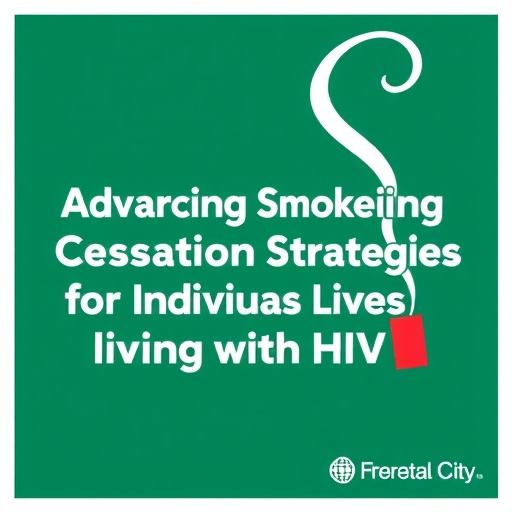People living with HIV who smoke face a heightened risk of mortality from lung cancer, surpassing deaths related directly to HIV itself. This alarming health disparity has driven researchers at the Medical University of South Carolina’s Hollings Cancer Center to embark on an innovative five-year project aimed at transforming tobacco cessation care for this vulnerable population. Backed by over three million dollars in funding from the National Heart, Lung, and Blood Institute, Drs. Alana Rojewski and Katherine Sterba are spearheading a groundbreaking initiative to train pharmacists as specialized tobacco cessation experts within HIV care environments.
Dr. Alana Rojewski, a recognized authority in tobacco cessation therapeutics, joins forces with Dr. Katherine Sterba, an implementation scientist who specializes in embedding evidence-based clinical practices into healthcare workflows. Together, they have developed ENHANCE-TTS (ENgaging pHarmacists to AdvANCE Tobacco Treatment Service), a tailored program that aims to enhance access to and the quality of smoking cessation interventions for people living with HIV. Central to this approach is empowering pharmacists at federally funded Ryan White clinics across South Carolina—facilities specifically serving uninsured or underinsured HIV-positive patients—to become proficient tobacco cessation specialists.
The impetus for this program is rooted in the disproportionately high prevalence of smoking-related morbidities among individuals with HIV. Research underscores that tobacco use exacerbates an array of comorbidities common in this group, including cardiovascular disease and pulmonary complications, while also dramatically increasing the incidence of tobacco-related cancers. By equipping pharmacists with advanced skills in tobacco cessation, the ENHANCE-TTS initiative seeks to integrate comprehensive tobacco treatment into the routine care of people with HIV, thereby addressing a critical public health need.
The training modules designed for this program leverage existing resources from Hollings Cancer Center’s Cancer Research Education and Training branch, augmenting them with specialized content co-developed by clinical pharmacy experts. Pharmacists are taught to perform meticulous tobacco use assessments, develop individualized cessation plans, and deliver behavioral counseling aligned with the latest clinical guidelines. Emphasis is placed on intervention strategies that address pharmacologic therapies alongside behavioral techniques that help patients navigate cravings, stressors, and relapse triggers in real-world contexts.
Moreover, Dr. Emily Ware, a clinical pharmacy specialist engaged as a co-investigator, has contributed expertise toward developing a bespoke training module geared specifically for clinical pharmacists. This module comprehensively covers operational aspects such as establishing clinical practice agreements and optimizing scheduling workflows to facilitate efficient and effective tobacco cessation service delivery within diverse clinical settings. This pragmatic component ensures that pharmacists can sustainably implement their newfound skills within the logistical realities of their respective clinics.
A pivotal element of the ENHANCE-TTS program is its adaptable design that acknowledges the heterogeneity of the participating Ryan White clinics. Recognizing that a universal, one-size-fits-all model is insufficient, the researchers collaborate closely with each clinic to tailor tobacco cessation protocols that reflect the clinic’s unique patient demographics, resource availability, and operational processes. This customization enhances both acceptance and feasibility, fostering an environment conducive to lasting implementation and improved patient outcomes.
The study’s evaluation framework is robust, focusing on three primary outcome domains. Firstly, investigators will quantify the extent to which HIV care providers increase tobacco use screening and cessation counseling once their clinic pharmacists have been trained as tobacco treatment specialists. This explores whether pharmacist training has a spill-over effect on enhancing provider engagement in tobacco cessation efforts. Secondly, qualitative assessments of patient, provider, and administrator perceptions will elucidate the program’s acceptability, usability, and fidelity to the intended intervention model. Lastly, prospective follow-up with a patient cohort receiving pharmacist-led tobacco treatment seeks to quantify the impact on quit rates and sustained abstinence, providing empirical evidence of clinical effectiveness.
The project’s potential implications are substantial. Successful training and integration of pharmacists as tobacco cessation specialists could radically expand the availability of high-quality tobacco treatment services for people living with HIV, a subgroup currently underserved in this regard. The intervention holds promise for mitigating the disproportionate burden of tobacco-related disease and mortality in this population, aligning with precision public health objectives that tailor interventions to specific community needs.
Dr. Rojewski expressed optimism about the endeavor’s capacity to extend tobacco cessation reach and magnify positive health outcomes. Complementing this, Dr. Sterba emphasized the importance of adaptive, context-sensitive models and envisaged dissemination of successful strategies not only throughout South Carolina but also on a broader national scale. Together, their interdisciplinary collaboration embodies a translational research paradigm that bridges evidence generation with real-world clinical application.
This initiative exemplifies the transformative potential of pharmacist-led tobacco cessation interventions embedded within specialized care settings. By harnessing pharmacists’ accessibility and expertise, the ENHANCE-TTS program is poised to fill critical gaps in tobacco treatment for people living with HIV. The research stands at the forefront of implementation science, marrying clinical innovation with system-level integration to enhance population health.
As the program advances, its findings will illuminate pathways toward scalable, sustainable tobacco cessation models that can be replicated in diverse healthcare systems confronting high smoking prevalence among vulnerable populations. By confronting the intersection of HIV care and tobacco control, this pioneering work seeks not merely to improve individual quit rates but to engender systemic change that elevates overall quality of life and reduces cancer-related morbidity and mortality for people living with HIV.
Subject of Research: Tobacco cessation interventions for people living with HIV through pharmacist-led training programs in HIV care clinics.
Article Title: Pharmacist-Led Tobacco Cessation: A Novel Approach to Reducing Lung Cancer Mortality Among People Living with HIV
News Publication Date: Not specified
Web References:
- Medical University of South Carolina faculty directory: Alana Rojewski
- Medical University of South Carolina faculty directory: Katherine Sterba
- Medical University of South Carolina: musc.edu
- MUSC Health: muschealth.org
Image Credits: Medical University of South Carolina. Photo by Cliff Rhodes.
Keywords: HIV, tobacco cessation, lung cancer, pharmacist training, implementation science, HIV clinics, smoking cessation, Ryan White clinics, public health, tobacco treatment specialists, clinical pharmacy, evidence-based interventions




